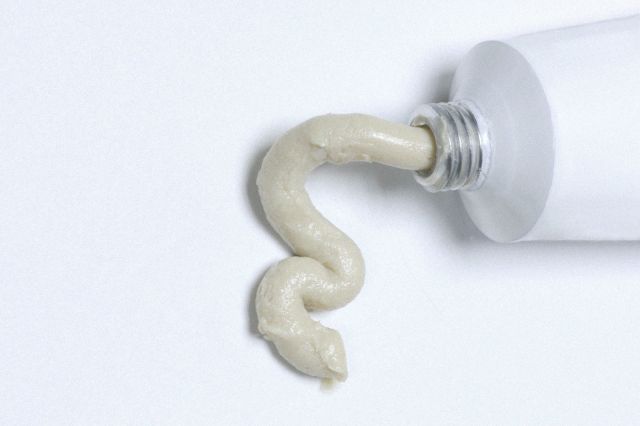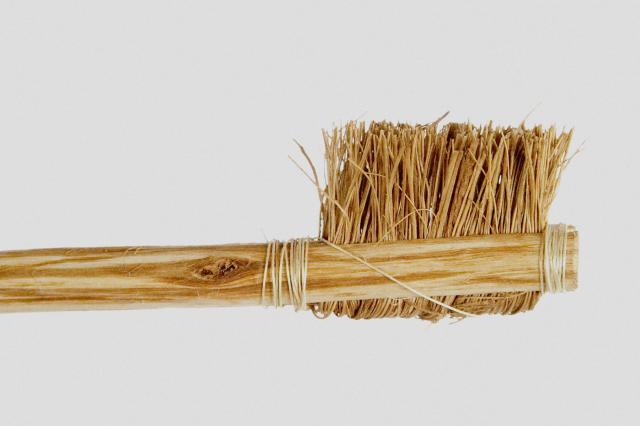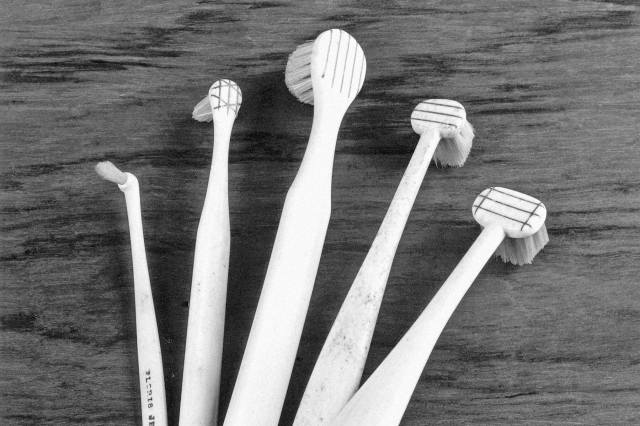
Credit: WilleeCole Photography/ Shutterstock
Posted on 04/09/2024 8:07:44 PM PDT by SeekAndFind
Since the fourth millennium BCE, when urban civilizations first appeared in ancient Mesopotamia, humans have strived to achieve proper dental hygiene. Yet the nylon-bristled toothbrush we use today didn’t come along until the 1930s. For the thousands of years in between, people relied on rudimentary tools that evolved with scientific knowledge and technological advancements over time. Some of the earliest toothbrush predecessors date as far back as 3500 BCE. Here’s a look at how people kept their teeth clean before the modern toothbrush.
Sometime around the year 3500 BCE, the ancient Babylonians (located near modern-day Iraq) created a tool known as a “chew stick.” This simple, handheld piece of wood is considered the earliest known direct predecessor to the toothbrushes we use today. Chew sticks were simple wooden twigs cut to approximately 5 or 6 inches long. One end of the stick was then softened in boiling liquid to help separate the fibers, creating an almost brushlike effect. Individuals would chew on these sticks to freshen their mouths, as the frayed fibers would slide between the teeth and help loosen debris. Many early Arab cultures used a specific shrub called Salvadora persica (also known as the “toothbrush tree”) to create their chew sticks, which they called miswak. The shrub was particularly aromatic in nature and thought to have a stronger mouth-freshening effect than other plants.
Around this same time, civilizations in Mesopotamia, Egypt, and elsewhere in the ancient world also used early versions of a toothpick to keep their teeth clean. These were often made of thin pieces of wood, though in later years, wealthy individuals began crafting toothpicks from brass and silver for added opulence and durability. In ancient Greece, toothpicks were known as karphos, roughly meaning “blade of straw,” suggesting the Greeks may have used coarse fibers such as straw in addition to wood.

Credit: WilleeCole Photography/ Shutterstock
Before handheld teeth-cleaning devices became widespread, many ancient civilizations relied on a dental cream made of various ingredients, including the ashes of oxen hooves, myrrh, egg shells, and pumice. This cream was first developed in ancient Egypt sometime before 3000 BCE, and was mixed with water and then rubbed into the teeth to help remove debris. Around 1000 BCE, flavorful ingredients such as herbs and honey were added to the mix by the Persians. Another thousand years after that, the ancient Greeks and Romans improved the cream even further by adding abrasive elements such as crushed bone and oyster shell to really help get rid of stuck-on debris.

Credit: Tyler Olson/ Shutterstock
The world of dental hygiene was forever changed thanks to the ingenuity of ancient China. During the Tang dynasty (618 to 907 CE), coarse hair fibers from the back of a hog’s neck were attached to a handle made of bamboo or bone, creating an early handheld toothbrushing device. Centuries later in 1498, Emperor Hongzhi of the Ming dynasty formally patented this hog’s hair toothbrush. For the next several centuries, artisan toothbrush makers around the world drew inspiration from ancient China and continued to heavily rely on coarse boar’s hair. In fact, toothbrush bristles didn’t see another major change until the middle of the 20th century.

Credit: Smith Archive/ Alamy Stock Photo
Boar’s hair toothbrushes didn’t really take off in Western Europe until the 17th century — before that, Europeans often relied on toothpicks, as well as rags rolled in salt or soot, as they believed the coarse substances helped remove debris from teeth. But around the mid-1600s, French dentists began pushing people to take better care of their teeth as they made scientific advances on the topic of dental hygiene. In 1649, an English politician named Ralph Verney, who was living in Paris at the time, was asked by a friend back in England to see if he could get his hands on some French-made “little brushes for making cleane of the teeth,” which were becoming more common throughout the region.
There was a bit of pushback in British society against using toothbrushes, however, as some people worried about the cost and hassle of replacing these devices that wore down over time. Instead, some promoted cheaper alternatives that could be easily crafted at home — the 1741 British text The Compleat Housewife advised wrapping a cloth around your finger and using that to clean your teeth instead, a process that had also been used in ancient Greece and Rome. But these detractors were in the minority, and the production of handheld tools began to expand. By 1780, Englishman William Addis realized how to improve upon the available toothbrushes of the time, which were using animal fibers sourced locally. Addis began importing boar’s hair directly from Siberia and northern China, as the boars from those cold climates had coarser, more durable hair to withstand the elements, which was believed to be more effective at cleaning teeth. Addis founded his namesake company shortly thereafter — which is still in operation today — and began successfully producing toothbrushes on a much larger scale.
As brushing one’s teeth became increasingly popular in Britain, that fervor spread to the British colonies in the Americas. Toothbrushes even caught the eye of future Presidents George Washington and Thomas Jefferson, the latter of whom instructed a London-based colleague to bring him “½ doz. Tooth brushes, the hair neither too strong nor too weak” as well as “½ doz. do. with the strongest hair, such as hog’s bristle.”
It wasn’t until the 19th century, however, that toothbrushes really became popular among everyday Americans, who previously relied on coarse clothes, toothpicks, and other rudimentary methods that were common back in Europe. This was in part due to the rise of a middle class with disposable income to spend on dental care products. The Industrial Revolution also increased commercial production of toothbrushes, which made the product available on a wider scale. On November 7, 1857, dental school graduate H.N. Wadsworth became the first American to successfully patent a toothbrush design, and large-scale production of toothbrushes began throughout the country by the mid-1880s. One of the earliest known American-made toothbrushes was produced by the Florence Manufacturing Company of Massachusetts. Known as the “Pro-phy-lac-tic,” the brush looked quite similar in design to many modern toothbrushes, though coarse animal hair was still used for the bristles.
On February 24, 1938, the U.S.-based DuPont chemical company changed the world of dental care with the debut of a new toothbrush featuring delicate nylon bristles instead of coarse hog’s hair. This was the first nylon toothbrush in the world, fitting since DuPont invented nylon to begin with. The synthetic bristles were just as effective at cleaning teeth, if not more so, and made using the tool more pleasurable. The first commercial nylon-bristled toothbrush was called Dr. West’s Miracle Tuft, and DuPont maintained exclusive rights to nylon bristles until the 1940s. Once that exclusivity expired, other manufacturers began incorporating the material into their own designs, and nylon bristles eventually became the standard.

"Most parts are edible."
I remember in grade school when we would be assigned to give a speech how many kids would give it on “how to brush your teeth”. Finally the teacher said, “ no more teeth brushing lessons speeches!”
My grandmother used to give us black Birch twigs off a branch of the tree. I got so I’d go hunting for my own to chew on.
Very tasty and refreshing. Apparently it may help fight cavities.
After wwii soldiers who had been taught to brush their teeth in the military went home and taught their families to brush. Remember all the toothpaste commercials in 50s and 60s?
Rare now.
And no new toothpastes. Last new toothpaste brand I recall is Tom’s in the 80s

What a great thread. Many thanks.
LOL
the best
We used whatever was cheapest.
Aim, IIRC, was one of them.
Very interesting.
We have a bunch of black birch on our property.
As an aside, it’s fantastic for the wood stove. Great burning hardwood with high heat content.
Someone told me it’s a rare tree. I don’t know about that.
Neem stick. You can still buy them on Amazon!
You can get fresh sticks and even request size from Neem Farms in FL. Buy American! https://neemtreefarms.com/
“What Did People Use Before Toothbrushes Were Invented?”
Pliers?
Thanks SeekAndFind. In Shakespeare's time, people cleaned their teeth first thing in the morning with a soft cloth and 'sweet paste'.

I quit using tooth past back in 1968. Started using baking soda and salt, then just baking soda. I have had ONE cavity since I started doing that. Still have all my teeth except wisdom teeth.
Cool, thanks for the link! I’ve never used them but I think it could be an interesting prep item
The jokes just write themselves!

Yes, I was surprised the article didn't mention the use of baking soda. I use baking soda dampened with hydrogen peroxide every once in awhile to remove coffee and tea stains.
“I’m going to eat your garage.” - vaguely remembered comedy skit.
Disclaimer: Opinions posted on Free Republic are those of the individual posters and do not necessarily represent the opinion of Free Republic or its management. All materials posted herein are protected by copyright law and the exemption for fair use of copyrighted works.